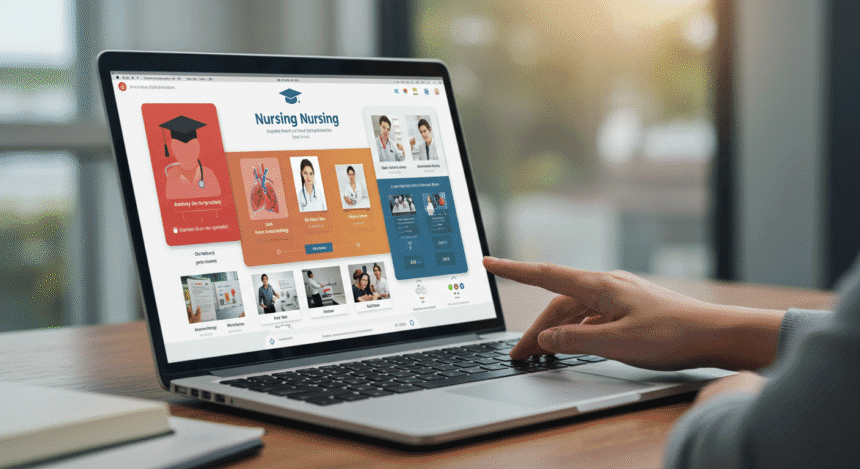There are many professions that you can go into if you want to work in healthcare. Nursing is one of the easiest and best, especially if you want to advance.
The nursing profession holds a cornerstone role in American health care, with 4.3 million actively licensed registered nurses in the United States. This workforce is currently the largest segment of health professionals in the United States, providing care in hospitals, clinics, and communities. Nurses have taken on more clinical and administrative responsibilities over the years and are now a mainstay of day-to-day patient care. Demand for nurses has remained steady, but the path to entering the profession has begun to shift.
More nurses are earning their credentials in ways reflective of broader trends in education. Among those who completed their initial nursing degree between 2000 and 2015, only 18.6% had completed any part of it online. That number more than doubled for graduates during the 2016-2020 time frame, to 46.4%. The greater use of online learning sites is revolutionizing how students prepare to enter their nursing careers. Programs that once were exclusively classroom-based are being revised to make way for new tools and formats, with more flexibility for students who juggle work, family, or other responsibilities.
Flexibility and adaptation are essential in today’s rapidly changing and fast-paced healthcare environment. For nurses who want to grow their knowledge and progress in their professions, Family Nurse Practitioner (FNP) programs provide a great route. However, traditional programs can be challenging to attend because of their demanding schedules. Online FNP programs fill this need by providing a convenient and all-encompassing education. These programs make it easier for you to enhance your career while maintaining your work-life balance. Although it isn’t as easy as a healthcare career that doesn’t require a degree, it is still a good one to pursue.
The Flexibility and Accessibility of Online Learning
One of the most appealing aspects of online FNP programs Florida is their flexibility. These programs are designed with the working professional in mind, allowing nurses to pursue advanced education without sacrificing their current jobs or personal commitments. With asynchronous classes, nurses can study at their own pace and during times that best fit their schedules. This flexibility is crucial for those with a busy work life and family obligations. The online format eliminates the need for long commutes and rigid class schedules, making education more accessible to nurses regardless of location.
Comprehensive Curriculum and Supportive Learning Environment
Online FNP programs offer the same rigorous and comprehensive curriculum as traditional on-campus programs, covering essential topics in family medicine, advanced pharmacology, and clinical practice. For instance, St. Thomas University provides students with a robust online learning platform with interactive modules, virtual simulations, and extensive digital libraries. Students are also supported by experienced faculty and advisors who guide and mentor them throughout their educational journey. This level of support ensures that students are well-prepared to meet the demands of advanced practice nursing.
Seamless Integration of Technology in Education
Integrating technology in online FNP programs enhances learning experiences and prepares students for the digital age of healthcare. Courses often employ virtual labs, video lectures, and interactive discussions that mimic real-life clinical situations. This technology-driven approach equips students with the necessary skills and confidence to use advanced medical technologies and telehealth services. Technologically adept nurses are better prepared to contribute to a rapidly advancing healthcare environment where digital solutions are increasingly pivotal.
Balancing Education and Professional Growth
By enrolling in online FNP programs, nurses can continue to gain professional experience while advancing their education. This simultaneous growth in practical and academic skills sets them apart in competitive healthcare. Nurses can immediately apply new knowledge and strategies to their current roles, enhancing patient care and clinical outcomes. Moreover, the ability to work while studying reduces the financial strain often associated with full-time education, making career advancement more feasible.
Creating Opportunities for Career Advancement
Graduating from an online FNP program opens doors to many career opportunities. With advanced training, nurses can transition into roles with greater responsibilities and higher earning potential. They can work in diverse healthcare settings such as clinics, hospitals, and community health organizations. FNPs also have the option to specialize further, tailoring their careers to their interests and meeting specific healthcare needs. The advanced skills and credentials earned from an FNP program make nurses valuable assets in an industry experiencing a growing demand for qualified practitioners.
Conclusion
Online FNP programs represent a remarkable advancement in nursing education, making it easier than ever for nurses to further their careers. These programs offer flexibility, a comprehensive curriculum, and robust support that empower nurses to achieve their professional goals while maintaining other life responsibilities. By embracing technological integration and fostering career growth, online FNP programs are paving the way for a new generation of nurse practitioners ready to meet the future challenges of healthcare. As the demand for skilled healthcare professionals grows, these programs provide the educational tools and learning experiences necessary to excel and lead in diverse medical fields.










